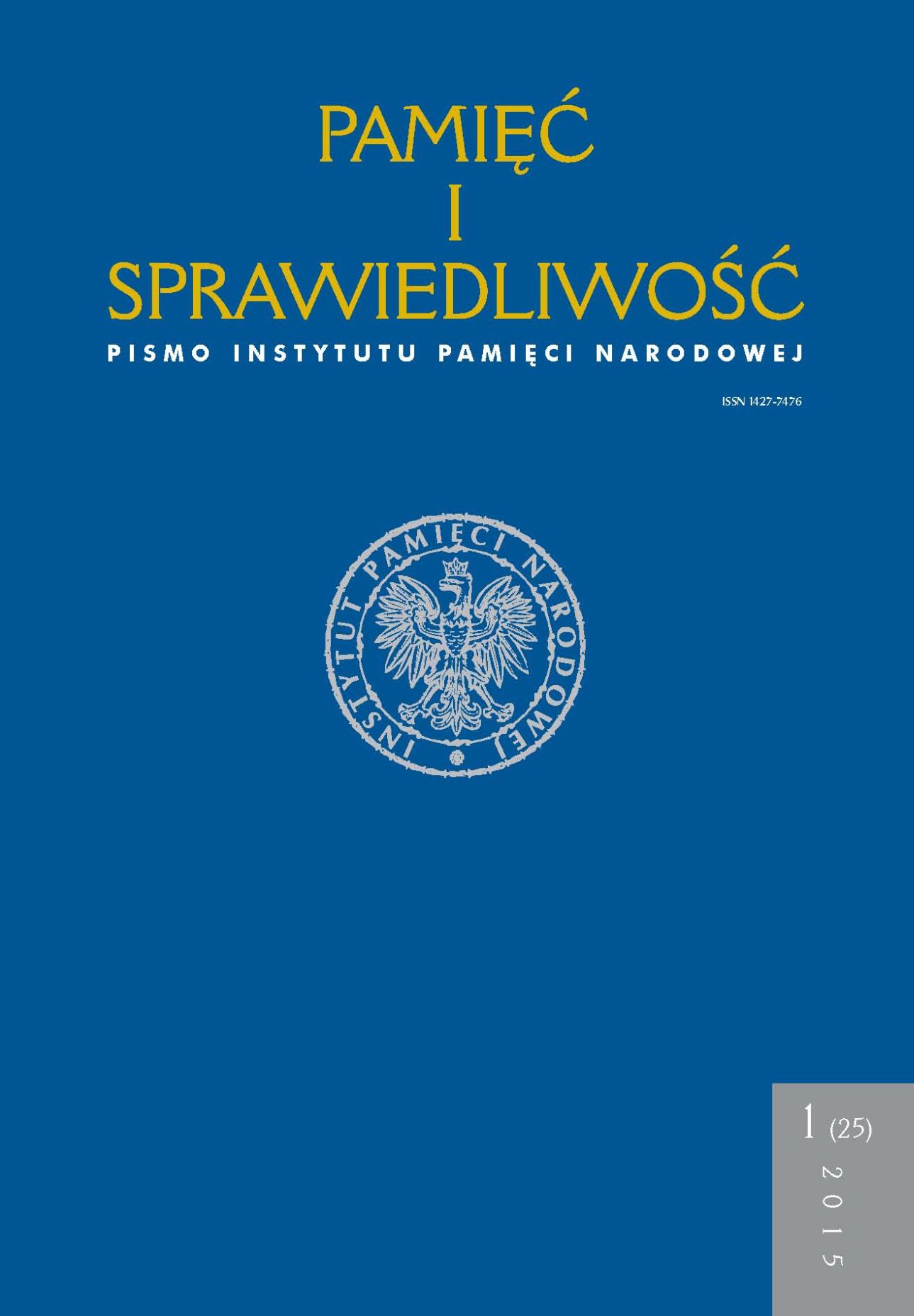The Road to Nuremberg. The Genesis of Judiciary Settling Accounts with Crimes of the Third Reich
Remembrance and Justice, Vol. 25 No. 1 (2015), pages: 79-111
Publication date: 2015-06-30
Abstract
Keywords
zbrodnie • III Rzesza • alianci • procesy • Norymberga • Międzynarodowy Trybunał Wojskowy crimes • Third Reich • Allies • trials • Nuremberg • International Military Tribunal
References
- Eric Foner, Reconstruction. America`s Unfinished Revolution, 1963–1877, New York, Harper and Rowe, 1988
- Franciszek Ryszka, Norymberga. P rehistoria i ciąg dalszy, Warszawa, Czytelnik, 1982
- Gary J. Bass, Stay the Hand of Vengeance. The Politics of War Crimes Tribunals, Princeton, Princeton University Press, 2000
- Arieh J. Kochavi, Prelude to Nuremberg. Allied War Crimes Policy and the Question of Punishment, Chapel Hill, University of North Carolina Press, 1998
- Jurgen Matthäus, The Lessons of Leipzig. Punishing War Criminals after the First World War [w:] Atrocities on Trial. Historical Perspectives on the Politics of Prosecuting War Crimes, red. P. Heberer, J. Matthäus, Lincoln, University of Nebraska Press, 2008, s. 9–18
- Taner Akçam, A Shameful Act. The Armenian Genocide and the Question of Turkish Responsibility, New York, Picador, 2006
- Norman Naimark, Fires of Hatred. Ethnic Cleansing in Twentieth Century Europe, Cambridge, Harvard University Press, 2001
- Grzegorz Kucharczyk, Pierwszy holocaust XX wieku, Warszawa, Fronda, 2004
- Yves Ternon, Ormianie. Historia zapomnianego ludobójstwa, tłum. W. Brzozowski, Kraków, Wydawnictwo Uniwersytetu Jagiellońskiego, 2005
- Bartosz Bolechów, Terroryzm w świecie podwubiegunowym. Przewartościowania i kontynuacje, Toruń Wydawnictwo Adam Marszałek, 2003
- Elżbieta Kobierska-Motas, Rząd polski na emigracji wobec problemu dokumentowania niemieckich przestępstw wojennych, „Pamięć i Sprawiedliwość. Biuletyn GKBZpNP” 1995, s. 175–176
- Franciszek Ryszka, U progu Norymbergi. Ściganie zbrodni wojennych w projektach polskich władz emigracyjnych, „Czasopismo Prawno-Historyczne” 1978, z. 2, s. 155-186
- Waldemar Grabowski, Polska tajna administracja cywilna 1940–1945, Warszawa, IPN, 2003
- Adam Puławski, W obliczu Zagłady. Rząd RP na Uchodźstwie, Delegatura Rządu RP na Kraj, ZWZ-AK wobec deportacji Żydów do obozów zagłady (1941–1942), Lublin, IPN, 2009
- Eugeniusz Duraczyński, Rząd polski na uchodźstwie 1939–1945. Organizacja, personalia, polityka, Warszawa, „Książka i Wiedza”, 1993
- Dariusz Stola, Nadzieja i zagłada. Ignacy Schwarzbart – żydowski przedstawiciel w Radzie Narodowej RP (1940–1945), Oficyna Nuakowa, Warszawa 1995
- Tadeusz Cyprian, Jerzy Sawicki, Ludzie i sprawy Norymbergi, Poznań, Wydawnictwo Poznańskie, 1967,
- Joe J. Heydecker i Johannes Leeb, Proces w Norymberdze, tłum. M. Zeller, Warszawa, Świat Książki, 2006
- G. Ginsburgs, Moscow`s Road to Nuremberg. The Soviet Background to the Trial, Hague, Springer, 1996
- B.F. Smith, The Road to Nuremberg, New York 1981
- Edward T. Linenthal, Preserving Memory. The Struggle to Create America`s Holocaust Museum, New York, Viking, 2001
- Tomasz Kranz, Majdanek w świetle prasy amerykańskiej z 1944 r., „Zeszyty Majdanka” 1993, s. 335-346
- Janina Kiełboń, Edward Balawejder, Państwowe Muzeum na Majdanku w latach 1944–1947. Wybór dokumentów, Lublin, Państwowe Muzeum na Majdanku, 2004
-David Irving, Norymberga. Ostatnia bitwa, tłum. B. Zborski, Warszawa, Prima, 1999
- Catherine Merridale, Wojna Iwana. Armia Czerwona 1939–1945, Poznań, Dom Wydawniczy Rebis 2007
- Norman Naimark, The Russians in Germany. A History of the Soviet Zone of Occupation, 1945–1949, Cambridge, Belknap Press of Harvard University Press, 1995
- William I. Hitchcock, Liberation. The Bitter Road to Freedom, Europe 1944–1945, London, Free Press 2009
- H.A. Buechner, Dachau. The Hour of the Avenger (An Eyewitness Account), Metaire 1986,
- Joshua M. Greene, Sprawiedliwość w Dachau. Opowieść o procesach nazistów, Warszawa, Świat Ksiązki, 2012
- Konrad H. Jarausch, Po Hitlerze. Powrót Niemców do cywilizowanego świata 1945–1995, Poznań, Wydawnictwo Nauka i Innowacje, 2013
- Timothy Snyder, Skrwawione ziemie. Europa między Hitlerem a Stalinem, tłum. B. Pietrzyk, Warszawa, Świat Ksiązki 2011
- Peter Novick, The Holocaust in American Life, Boston, Houghton Mifflin Co, 1999
- Wiliam A. Schabas, Raphael Lemkin, Genocide and Crimes against Humanity [w:] Rafał Lemkin. A Hero of Humankind, red. A. Bieńczyk-Missala, Sławomir Dębski, Warszawa 2010, s. 233-256
- Ann Tusa, John Tusa, The Nuremberg Trial, London, Macmillan, 1993
- Telford Taylor, The Anatomy of the Nuremberg Trials. A Personal Memoir, Boston 1992,
- Arkady Vaksberg, Stalin`s Prosecutor. The Life of Andrei Vyshinsky, New York, Grove Pr, 1991
- Tadeusz Żaczek, Antoni Pajdak 1894–1988. Uczestnik walk o niepodległą Polskę od Legionów do Solidarności, Warszawa, Comandor, 2004
- Bradley F. Smith, Reaching Judgment at Nuremberg, New York 1977
- Kristen Sellers, Imperfect Justice at Nuremberg and Tokyo, „The European Journal of International Law” 2011, nr 4, s. 1085-1102
- Christian Tomuschat, The Legacy of Nuremberg, „Journal of International Criminal Justice” 2006, nr 4, s. 830-844
Most read articles by the same author(s)
- Jerzy Eisler, Andrzej Friszke, Paweł Machcewicz, Andrzej Paczkowski, Janusz Wrona, [Dyskusja] PKWN – próba oceny , Remembrance and Justice: Vol. 8 No. 2 (2005)
- Sławomir Łukasiewicz, Paweł Machcewicz, Paweł Sasanka, Paweł Ziętara, Rok 1956 - 60 lat później. Dyskusja z udziałem Sławomira Łukasiewicza, Pawła Machcewicza, Pawła Sasanki, Pawła Ziętary , Remembrance and Justice: Vol. 28 No. 2 (2016)
- Paweł Machcewicz, Grzegorz Motyka, [Recenzja] W odpowiedzi Frankowi Grelce , Remembrance and Justice: Vol. 6 No. 2 (2004)
- Edmund Dmitrów, Antoni Dudek, Andrzej Friszke, Paweł Machcewicz, Andrzej Paczkowski, Jerzy Józef Wiatr, [Dyskusja] Polityka wobec historii, historiografia wobec polityki: PRL i III Rzeczpospolita , Remembrance and Justice: Vol. 1 No. 1 (2002)
- Paweł Machcewicz, Prokop Tomek, [Recenzja] Paweł Machcewicz, „Monachijska menażeria”. Walka z Radiem Wolna Europa 1950–1989, Instytut Pamięci Narodowej, Instytut Studiów Politycznych PAN, Warszawa 2007, ss. 444 , Remembrance and Justice: Vol. 14 No. 1 (2009)
- Paweł Machcewicz, Operation „Olcha”. Władysław Bartoszewski, Radio Free Europe and Security Service , Remembrance and Justice: Vol. 10 No. 2 (2006)
 Język Polski
Język Polski
 English
English
 Deutsch
Deutsch
 Français (France)
Français (France)
 Italiano
Italiano
 Русский
Русский


 PDF (Język Polski)
PDF (Język Polski)
